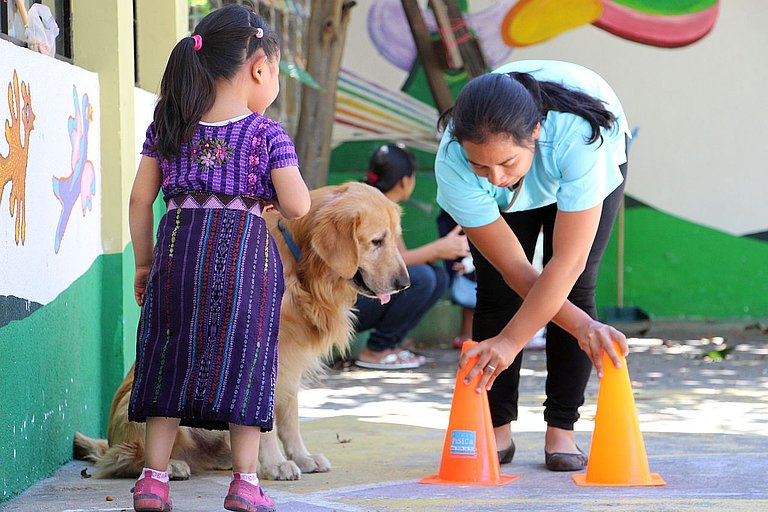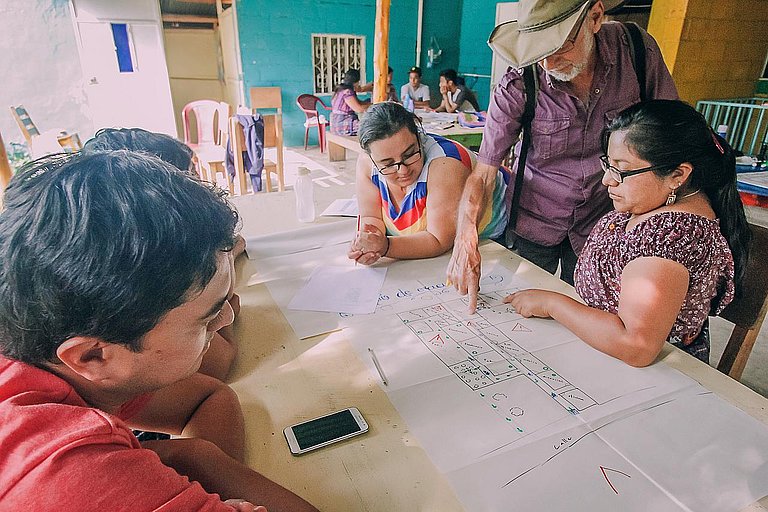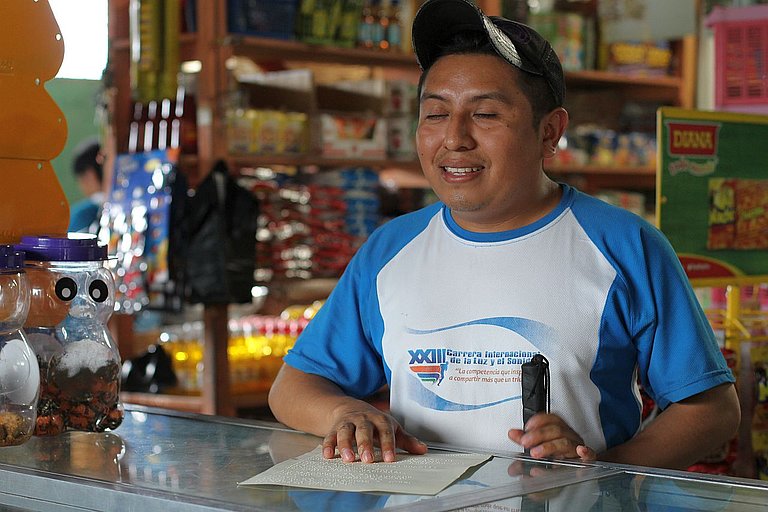The lives of many families with children and young people with disabilities in Guatemala are marked by shame and fear; often the children are hidden or even tied up," reports Karin Eder, office manager of AWO International in Guatemala. People with disabilities in Guatemala already have a hard time in everyday life. However, they are particularly vulnerable to natural disasters, as hardly any attention is paid to their needs. And yet natural disasters are not uncommon in Guatemala: Earthquakes, droughts, volcanic eruptions and also landslides and floods occur regularly. The World Risk Report lists Guatemala in 4th place among the most vulnerable countries.
ACOPEDIS: A network for the inclusion of people with disabilities

Sololá, one of the 22 departments in Guatemala, is particularly threatened by natural disasters due to its geographical location. Around 90 percent of Sololá's population is in danger of becoming the victim of an extreme natural event. Lake Atitlán lies in the centre of the department, surrounded by volcanoes and mountains, where landslides and earthquakes are the greatest danger for the population. For this reason, AWO International and its project partner ACOPEDIS have been carrying out a disaster prevention project at Lake Atitlán since January 2015. The aim is to help children and young people with disabilities and their families to be better prepared for extreme natural events. The local network works together with its 14 grassroots organisations to achieve this. The common goal of all organisations is the inclusion of people with disabilities in all areas of society. However, the individual organisations set different priorities in their inclusion work: while (early childhood) rehabilitation and physiotherapy are offered for people with disabilities in the state-approved school ADISA, for example, adolescents and young adults with disabilities produce handicrafts in the workshop of the association Artesanos de ADISA.
Crisis simulations to prepare for emergencies
In order to counter the dangers for people with disabilities, ACOPEDIS put together training teams in the first two project phases from January 2015 to December 2017. These teams are made up of specialists from various fields, such as psychologists, social workers and physiotherapists. In close consultation with the families, they developed training and further training materials adapted to the needs of children and young people with disabilities. In the training courses it then became concrete: In groups they worked out emergency plans and practised how to react adequately in emergency situations.
In order to also increase the local authorities' awareness of the vulnerability of children and young people with disabilities in disaster situations, the state institutions for disaster management at the local and municipal level (COLRED and COMRED) and the municipal representatives were trained in crisis management with people with disabilities. Together with the authorities, ACOPEDIS developed instruments to better respond to the needs of children and young people and adapted local disaster plans.
This is because the risk of people with disabilities becoming victims in the event of a natural disaster is particularly high. It is often not easy for people with intellectual disabilities to recognise dangerous situations and to know how to behave correctly in such situations. Although people with visual impairments understand what is happening around them, they have problems finding their way to a safe place. People with a physical disability lack the necessary mobility to move to a safe place. Deaf people, on the other hand, know what to do but cannot hear the warning signals. For this reason, the state authorities need adapted instruments for children and young people with disabilities in order to be able to provide adequate help in emergency situations.
Development of four inclusive model communities

In the third project phase (January 2018 to June 2019) ACOPEDIS is developing four model communities around Lake Atitlán. The aim is to ensure that the communities are prepared for an emergency response and can react appropriately in a crisis situation. To this end, families with relatives with disabilities will continue to be cared for and trained, and the relevant state institutions will also be sensitised to the issue of inclusion. People with disabilities should not only be given special consideration in the event of a crisis situation, but also be included in decision-making processes. In addition, construction measures are being implemented in individual homes of families with relatives with disabilities to improve the accessibility of people with disabilities and thus enable them to escape in the event of a disaster. The aim is to ensure that the model communities are seen as positive examples of good practice by state institutions at departmental level and serve as a guide to promote the issue of inclusion in disaster prevention and humanitarian aid in other communities as well.
ACOPEDIS also carries out public relations and lobbying work in order to create greater awareness among the population and state institutions for the issues of inclusion and the rights of people with disabilities. Among other things, the project partner will implement a campaign that tells the stories and living conditions of people with disabilities both through social media channels and on radio and television, in order to draw attention to the living situation of people with disabilities. The member organisations of ACOPEDIS are also to be involved in the implementation of these measures in order to be recognised by state authorities as contact partners in the field of inclusion.
Projectinfo
| Project | Including disaster preparedness in Guatemala |
|---|---|
| Place/Region | Sololá, Panajachel, San Andrés Semetebaj, San Lucas Tolimán, Santiago Atitlán, San Pedro La Laguna, San Juan La Laguna, Santa Catarina Iztahucán im Depatamento Sololá, Guatemala |
| Partner | ACOPEDIS |
| Target group | 400 children, adolescents and young adults with disabilities and their 2,400 family members, 300 neighbours, teachers and pupils, members of state institutions and community representatives |
| Activities |
|
| Duration | 2015-2019 |
| Budget | 249.450 Euro |
| Sponsor | Aktion Deutschland Hilft |

![[Translate to Englisch:] Eine Mitarbeiterin und Partizipierende bei einem Workshop für die Herstellung von Hygieneprodukten (Foto: Carlos Cano/ AWO International) [Translate to Englisch:] Eine Mitarbeiterin und Partizipierende bei einem Workshop für die Herstellung von Hygieneprodukten (Foto: Carlos Cano/ AWO International)](/fileadmin/_processed_/6/3/csm_Carlos_Cano_x_ACCSS_1_1280x800_b24e28b01c.jpg)